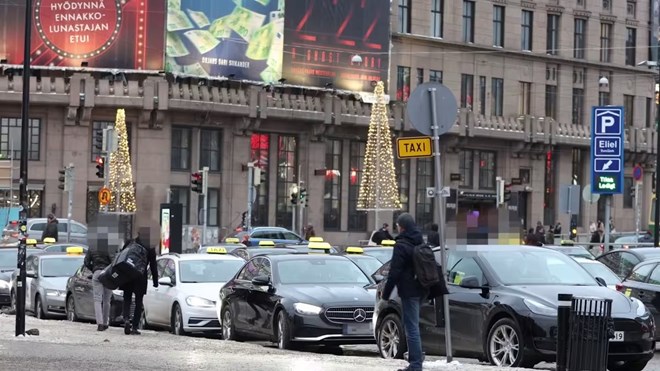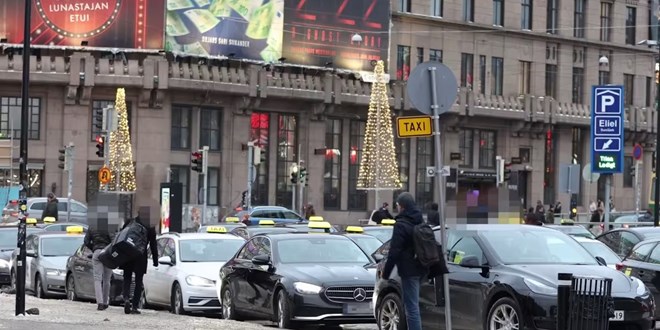[ad_1]

Tuesday December 12, 2023

Capital region taxi drivers tell Yle that some operators have set up their own queueing systems at key ranks around the city, while threatening other drivers.
“I’ll kill you, I know where you go and where you live, I’ve been following you for a long time and if you come here again, it’s over for you.”
This is an example of one of the threats that Aleksi, a taxi driver operating in the capital region, told Yle he received at a Helsinki rank — the place where he usually picks up his fares.
The threats he received and violence be experienced were not at the hands of unruly passengers, but were carried out by fellow taxi drivers.
Aleksi did not wish to be named in this article due to the sensitivity of the subject, and because he said he fears for his own safety.
The taxi drivers interviewed by Yle for this article all told a similar story, that so-called ‘rogue taxis’ — that is, taxis operating under an operation other than a well-known taxi company — have started to divide Helsinki into territorial areas.
The drivers told Yle that these operators try to prevent others from entering the taxi ranks they control.
“Over the past three years, these rogue taxis have taken over certain ranks, such as around the Central Railway Station, the Tripla shopping centre and some nightclubs. They have their own rules and their own cartels,” Aleksi said.
Yle interviewed a total of 10 taxi drivers working in the Helsinki metropolitan area for this article, all of whom work for the larger, more-established taxi companies such as Taksi Helsinki or Lähitaksi. Although the names are anonymised, Yle has verified their identities and confirmed that they work or have worked in the sector.
All of the 10 interviewees said they have been threatened in various ways when they have tried to enter what might be considered to be the “wrong” rank.
“I have stopped driving a taxi for safety reasons. When my daughter was threatened with being raped and killed, I decided to quit this job,” Kimmo said.
Kimmo also spoke to Yle on the condition of anonymity.
He noted that if there is a problem with a taxi driver working for a branded company, the passenger or driver can complain to the taxi firm, but this is not possible with operators outside of the established system.
Shouting and complaining
“It’s a sad situation,” according to Mikael Kaasinen, who has been driving a taxi around the capital since the 1990s.
He is referring specifically to the behaviour of some taxi drivers around Helsinki’s central railway station.
“It’s a bazaar that makes me so sick that I don’t bother going there anymore. The last time I went there in person, there was a block of cars in front of me and I couldn’t get in or out. After a fair bit of discussion, I was able to get in, but I was completely blocked from doing my job,” he said.
Kaasinen noted that a queueing system for drivers has developed around the train station as well as the Tripla shopping centre which is run by what he termed as “questionable means”. His view is backed up by the other drivers interviewed by Yle.
Yle has covered the faces of the customer and the taxi drivers in the above video.
The drivers recounted how, when a customer approaches the rank, they are met by a “steward” who brings them to a specific car.
“The front and back of the rank have timetables that show who will take the next potential customer. If a customer tries to bypass this system and chooses, for example, a branded taxi, there is a lot of shouting and complaining,” according to Annukka, an experienced taxi driver.
Annukka also asked that her true identity not be revealed in this article, due to safety concerns.
She said the constant conflicts and unpleasant atmosphere at the train station and Tripla ranks have led to her actively avoiding both areas.
“I wouldn’t be at all surprised if someone there accidentally reversed into my car. I’ve been asked at the station what the hell am I doing there. I’ve replied matter-of-factly that I’m trying to do exactly what you’re doing here, which is to earn my own living. Often people try to pick a fight or just sit back and stare,” she said.
According to Finland’s Taxi Act, customers should have the right to choose any taxi.
Competition has intensified, police say
Sergeant Andreas Grönman of the Helsinki Police Department told Yle that the problems in the taxi industry are linked to the explosion in the number of taxi drivers in recent years, following the liberalisation of the market in 2018.
“Before the reform, a certain number of taxis were allowed on the roads, but now the taxi stations may not have enough capacity. These threats may reflect increased competition for paying customers,” Grönman said.
He added that the police have become aware of the queueing system at Helsinki’s central railway station, which is contrary to legislation on the industry.
“We have observed a kind of small-scale alliance that seems to be based on mutual agreement,” he said.
Taxi driver Leena has seen this too.
“There are clearly one or two people who are bossing others. I think this could be an indication of clan culture or mafia-like behaviour. On the other hand, it could be a person who owns the cars,” Leena said.
Leena also asked for her true identity to be concealed in this article.
Annukka recalled how she once saw a man appear at the train station rank to collect money from taxi drivers of Somali and other African backgrounds, but she said he did not approach any of the other drivers.
Female taxi drivers face violence, threats
Many of the taxi drivers interviewed by Yle raised the issue of threats and violence directed at female drivers, including an alleged assault in June last year.
They reported that Leena — mentioned earlier in this article — was attacked and punched in the face.
“It took a long time to recover from the assault,” Leena said. “I was used to all kinds of abuse and name-calling, but to being attacked — and especially to being attacked by a man. It really broke my sense of security that I was hit and that there was no respect for the integrity of others.”
The case was reported to police and the investigation is still ongoing. Based on Yle’s information, the alleged assailant is still driving a taxi.
Annukka told Yle that she has also been subjected to violence, recalling how she was cleaning the back of her car at the train station when someone slammed the door shut, with considerable force. Annukka was caught in the door.
“They hate me like the plague. Of course, I don’t see it as a problem that I’m a woman and I drive a taxi. But for some people this seems to be a big problem,” Annukka said.
According to Sylvia Akar, a university lecturer specialising in Middle Eastern and Islamic studies at the University of Helsinki, some of the more conservative interpretations of Islam believe that women should not work in a context where they have to deal with strange men.
“We could say that there are professions that are suitable for women, or that are not suitable for women. Being a taxi driver is a profession where you have to serve male customers and you’re on your own, and not everyone thinks it’s a terribly desirable or appropriate job for a woman,” Akar explained, adding that it could be viewed by some as a woman trespassing on men’s territory.
“There have been signs of a tightening of the interpretation of Islam among some sectors of the Muslim population. In contrast to a few decades ago, there is now a much stricter approach to the rules of Islam. Of course, this does not apply to all Muslims,” Akar said.
All of the female taxi drivers interviewed by Yle said they are used to being called different names.
“I’m sometimes a whore, sometimes a racist, sometimes a racist whore, sometimes a monkey. But I haven’t given up, I still go to the station square, for example. They don’t put much effort into bullying me anymore,” Leena said.
Tuula, however, told Yle about her experiences of being told what to do or insulted, which she feels is due to her being a woman.
“For example, I have been told that I am a whore and I don’t know who the father of my children is,” she said.
Police: Small group creating bigger problems
Deputy National Police Commissioner Sanna Heikinheimo of the National Police Board was unable to explain why authorities have struggled to bring the situation under control.
“That’s a good question. Several times a year, the police, together with the taxi authorities, Traficom and the Regional State Administrative Office, carry out joint checks. Problems arise despite the fact that the capital region is a priority area for the authorities in terms of control,” Heikinheimo said.
The taxi ranks at Tripla and the main railway station have a high number of drivers of immigrant backgrounds, leading some drivers to question whether the authorities are reluctant to get involved for fear of being accused of racism.
“This is a very strange allegation. We target all kinds of people, from rogue taxis to drivers of Somali and Middle Eastern backgrounds, if they do not comply with the law,” Heikinheimo said.
“There are problems everywhere, but more so with these rogue taxis. Immigrants are an important segment of the taxi industry and, as a rule, they are good drivers and workers. However, a small number of them are causing problems, which also affects the good immigrant drivers,” Taxi Association President Tuomo Heino noted.
Fred Kibet, a taxi driver of immigrant background, agreed with this view. He told Yle News that he is worried the behaviour of a small number of immigrant background operators will affect the wider community of drivers.
“This means that while sitting at the taxi station, waiting for a customer for hours, they might choose a Finnish driver’s car just because it’s perceived as “safer.” My question is, who can advocate for us Africans? Who can help us in trying to make Finnish society aware that the majority of us follow the rule of law,” he said.
Who is taking responsibility?
Taksi Helsinki’s CEO Juha Pentikäinen confirmed that the sector faces many challenges, as described by the interviewees in this article.
“We have people who are afraid to work. Or if they do, they’re told they’re going to get their asses kicked and their lives taken away. But Finland is a country that is considered a constitutional state and should be safe to live in,” Pentikäinen said, adding that he would question how the situation at the ranks has been allowed to continue for so long without any intervention from the authorities.
“It’s either unwillingness or inability, or a combination of both. There may be a problem of division of labour or of responsibility: the police are in charge of law enforcement and traffic control, Traficom is in charge of quality control of the taxi sector. Other problems in the sector seem to belong to no one,” he said.
Pentikäinen noted that similar issues arose in Denmark following the liberalisation of its taxi sector.
“In Denmark, too, there was a period of chaos immediately after the liberalisation of the taxi sector. But the political decision-makers decided they would put things right. There are eight police officers at the Copenhagen police station who do nothing more than monitor the taxi market and its rules — unlike here in Finland,” Pentikäinen said.
[ad_2]
